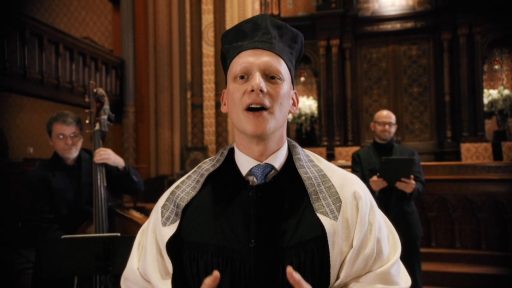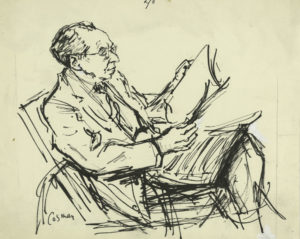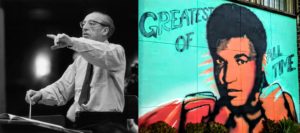
To make sure that I don’t miss any announcements about Copland performances, recordings, and publications I am signed up to Google Alerts. This means that every day I get the latest updates. Of course, most don’t get a second glance but a couple of months back I got really excited when I saw that there was a new documentary series presented by the conductor and violinist Scott Yoo on PBS called Now Hear This which would be focussing on three American composers, Amy Beach, Florence Price and Copland.
I immediately clicked on the links to the programme website and saw there were loads of previews and clips from the shows. I was delighted and couldn’t wait to play them all. However, my enthusiasm was immediately thwarted. As I am based in the UK as soon as I clicked them, I was told that this content was not viewable in my location.
I reached out to PBS and a few weeks later managed to get permission to watch a press copy online.
What’s covered in the documentary?
The documentary is extremely good. Sure, it does focus quite a lot on typical Copland fare – Appalachian Spring and Quiet City in particular, but it also provided some really welcome insights elsewhere. Top of the list is the fact it spends a major part of the first quarter discussing Copland’s hard on the ear 1928 piano trio Vitebsk – Study on a Jewish Theme. This is a piece that I have often struggled with. It’s one of Copland’s least easy listening experiences and because his aim was to “reflect the harshness and drama of Jewish life in Russia” I guess that is exactly the point. Context is everything – firstly the music that Copland would have heard as a young boy is introduced and sung beautifully by Cantor Daniel Mutlu of the Central Synagogue. Then violinist Steven Copes, cellist Mark Kosower, and pianist Susan Grace show how Copland incorporated the Jewish theme Mipnei ma into this incredibly strident, modernistic work. It’s fascinating to hear how Copland used quarter tones that are intentionally out of tune and combined major and minor chords in the piano to generate this harsh sound. It’s a world away from Americana but you can really hear the germination of Copland’s later work in this unlikely starting point. This whole section is scintillating and as it’s quite an obscure piece that rarely gets this treatment, it is a real gem.
Copland the teacher
The programme is interesting for other reasons too. The documentary dedicates a great deal of time to the next generation of performers, the hook being that Copland taught other composers and performers at summer schools throughout his life. This is a really nice take because it would have been so easy to go over the very familiar A-Z of Copland’s life – Brooklyn/Paris/ Modernism/Americana/Hollywood/McCarthy/Dean of American Composers etc.

Scott Yoo and John Novacek instructing students how to play Rubin Goldmark’s Piano Trio.
What is unusual though is that although teaching is at the epicentre of the documentary, Copland’s most famous teacher Nadia Boulanger doesn’t get a mention! Instead we get to hear more about Rubin Goldmark who taught Copland in his teens and up to his Paris years in 1921. As with Vitebsk it is a real joy to hear the students playing Goldmark’s piano trio. Copland often was a bit dismissive of Goldmark so it’s great to hear more about him, his legacy and hear a piece he composed. It’s a good ‘un too!
Plenty of the music in this programme is not actually Copland. Apart from the Goldmark there are two pieces by Mozart (the oboe concerto and violin concerto). A lot is made of the similarity of Mozart and Copland – in as much that there is no room for error when you play this music and that precision is everything. Again, this is a nice touch, as so often, programmes like this really only focus on a composer in a vacuum rather than their place in the overall pantheon of the greats.
There are other useful snippets. It’s a nice touch when pianist and Copland enthusiast John Novacek compares Copland’s signature sound of Billy the Kid to Thomas Newman’s American Beauty soundtrack. This really does illustrate the influence that Copland’s music had on Hollywood.
The programme predominantly focusses on the music and teaching. We learn very little about Copland the man, only that he lived very simply. What is quite amazing and a little odd is that in the entire programme there is not one single image of Copland. As a result, if you don’t know what Copland looked like then you might as well be listening to the radio! Alternatively, you might think (like Leonard Bernstein before they met), that Copland looked like Walt Whiltman or God!
What is a shame is that the programme only follows Copland’s musical journey up to Appalachian Spring. Copland composed this when he was just 44 so the programme does feel like it could do with a second part.
A documentary series that deserves a worldwide audience
Through my efforts to get a view of this prohramme I found out that only 15% of PBS programmes make it to UK airwaves via PBS America. I sincerely hope this is one of them. The inspirational teaching, insight offered and words of wisdom given by the musician teachers on technique, showmanship and how to deal with auditions would certainly benefit any young musician.
It appears that DVD copies of the Now Hear This series are also available but these only play on Region 1 players so anyone in Europe, Japan, South Africa and the Middle East won’t be able to watch either. I hope PBS consider a streaming option of this important series so anyone around the world can watch the whole thing rather than the odd clip on their YouTube channel. I personally would love to see the other programmes in the current series on Florence Price and Amy Beach. Fingers crossed!








Leave a Comment